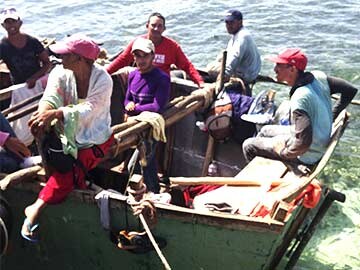
Grand Cayman, Cayman Islands:
An open wooden boat carrying 34 Cuban migrants sought refuge at a dock in the Cayman Islands on Sunday but was turned away, the second Cuban migrant vessel to be rejected in a week.
Local law enforcement allowed the migrants to take on drinking water, but no food, before ordering the group to depart immediately or be taken into custody and repatriated to Cuba. Just a couple of days earlier, another boat carrying 30 Cubans was ordered to leave the British territory.
The Cubans said they were mostly from the cities of Bayamo and Manzanillo in eastern Cuba, and were headed for the coast of Central America.
Boats smuggling Cubans seeking to flee the communist-run island are frequently seen off the Cayman Islands, located in the Caribbean less than 100 miles (160 km) south of Cuba.
They are usually headed for Honduras, from where migrants make the long journey overland to reach the U.S. border with Mexico. Under the U.S. so-called "wet foot, dry foot policy," Cuban migrants who make it onto United States soil are allowed to remain while those intercepted at sea are turned back.
The oldest passenger, a 54 year-old who identified himself only as Ariel, said he was a former chauffeur and decided to make the risky voyage because of a lack of job opportunities in Cuba's weak economy.
Some of the refugees were allowed brief use of bathroom facilities on a public beach at East End dock on Grand Cayman before returning to their bench seats on the open 20-foot-long (6-meter-long) boat with an engine but no sail, a faded Cuban flag hoisted in the rear and large inner tubes serving as makeshift outriggers.
Another group of 30 Cubans spent almost two weeks drifting off the coast of Grand Cayman before being given an ultimatum on Wednesday to depart or be taken into custody and repatriated. Five Cubans chose to come ashore and were detained, according to local officials. The rest departed early on Friday.
Under an existing agreement between Cuba and the Cayman Islands government, migrants who come ashore are usually repatriated. Cayman and Cuban officials are due to meet later this year for delayed migration talks.
The current agreement, signed in 1999, says Cuban migrant boats are allowed to pass through Cayman waters as long as they do not seek any assistance.
Local law enforcement allowed the migrants to take on drinking water, but no food, before ordering the group to depart immediately or be taken into custody and repatriated to Cuba. Just a couple of days earlier, another boat carrying 30 Cubans was ordered to leave the British territory.
The Cubans said they were mostly from the cities of Bayamo and Manzanillo in eastern Cuba, and were headed for the coast of Central America.
Boats smuggling Cubans seeking to flee the communist-run island are frequently seen off the Cayman Islands, located in the Caribbean less than 100 miles (160 km) south of Cuba.
They are usually headed for Honduras, from where migrants make the long journey overland to reach the U.S. border with Mexico. Under the U.S. so-called "wet foot, dry foot policy," Cuban migrants who make it onto United States soil are allowed to remain while those intercepted at sea are turned back.
The oldest passenger, a 54 year-old who identified himself only as Ariel, said he was a former chauffeur and decided to make the risky voyage because of a lack of job opportunities in Cuba's weak economy.
Some of the refugees were allowed brief use of bathroom facilities on a public beach at East End dock on Grand Cayman before returning to their bench seats on the open 20-foot-long (6-meter-long) boat with an engine but no sail, a faded Cuban flag hoisted in the rear and large inner tubes serving as makeshift outriggers.
Another group of 30 Cubans spent almost two weeks drifting off the coast of Grand Cayman before being given an ultimatum on Wednesday to depart or be taken into custody and repatriated. Five Cubans chose to come ashore and were detained, according to local officials. The rest departed early on Friday.
Under an existing agreement between Cuba and the Cayman Islands government, migrants who come ashore are usually repatriated. Cayman and Cuban officials are due to meet later this year for delayed migration talks.
The current agreement, signed in 1999, says Cuban migrant boats are allowed to pass through Cayman waters as long as they do not seek any assistance.
© Thomson Reuters 2014
Track Latest News Live on NDTV.com and get news updates from India and around the world

